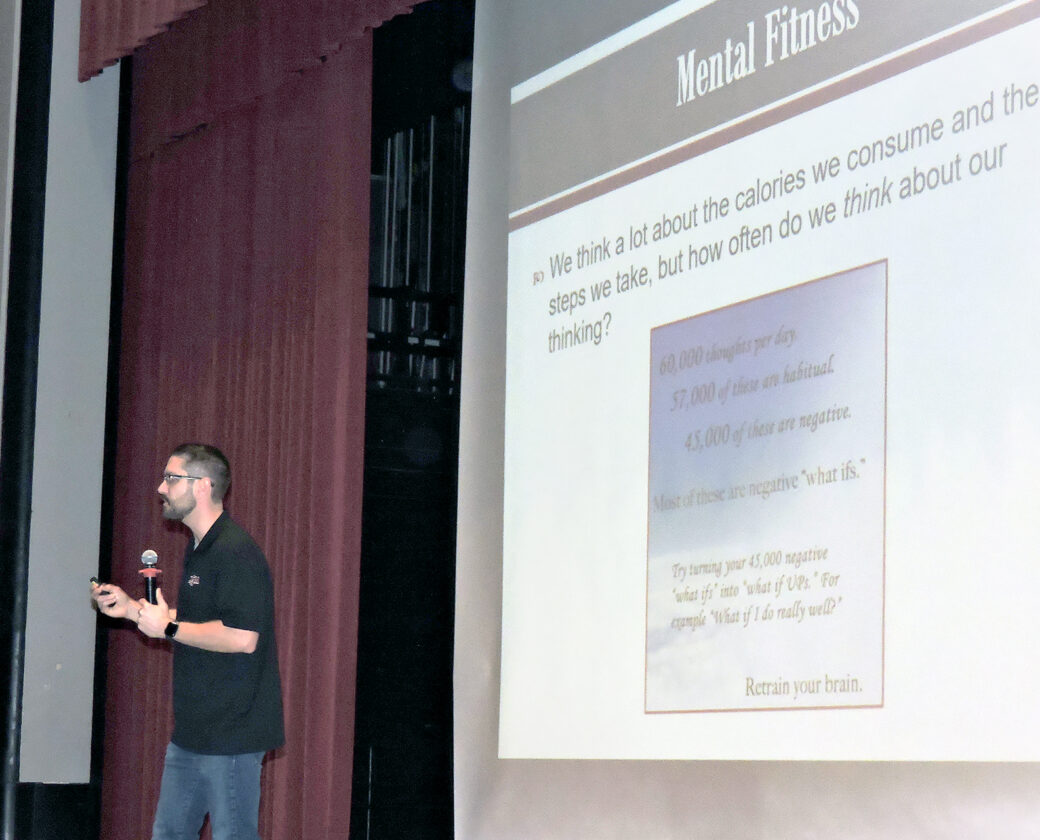Students encouraged to shut out negative thoughts

POSITIVE THINKING — Steve Wize, president and founder of Mental Fitness LLC, spoke to Steubenville High School students on Wednesday about focusing on positive thoughts and blocking negative ones to maintain a healthier mental state. Wize’s visit was supported by the Josh Merriman Foundation, a local charity aimed at preventing suicide and promoting good mental health. -- Warren Scott
STEUBENVILLE — Steve Wize, a licensed clinical social worker and founder of Mental Health LLC, told students at Steubenville High School on Wednesday that blocking negative thoughts can be like keeping a negative neighbor out of the house.
“It all starts with what you allow into your head,” said Wize, whose talk was supported by the Josh Merriman Foundation, a local charity aimed at preventing suicide and promoting good mental health.
Wize said key to maintaining a healthier mental state is avoiding the following “seven deadly phrases:”
• I can’t. Wize noted automotive pioneer Henry Ford said if a person says he can’t do something, he’s right because it has become a self-fulfilling prophesy.
Wize advised the teens to focus on what they can do.
“Whatever you want to do, your attitude is what matters,” he said.
• I need. Wize said too often people look for approval from others, money or other exterior rewards, “giving up emotional control to something external.”
He said under such conditions, “Happiness may never happen. Happiness comes from within.”
• Makes me, as in a person or thing causes one to behave or feel a certain way.
“If you say this makes me, you’re giving up all emotional power to that thing. You let your circumstances define you instead of letting ‘you’ define you,” Wize said.
• I should have or shouldn’t have, which may indicate a person is dwelling on regrets about the past or worries over the future.
“The happiest people stay in a positive, present space,” said Wize, who added a person can learn from his or her mistakes but should not be held back by them.
• Always and never. Wize said generalized thinking about past failures can result in a self-defeated attitude. Such words should be avoided, he said, unless they are used in this way: “Always believe in yourself and never give up.”
• Have to. Wize said too often people think of a difficult task or aspect of an experience as a roadblock instead of something they “get to do” to attain a particular goal.
“If you’re grateful, you’re happy,” he said.
• Happens to me, which Wize said reflects a view the world is unfair to that person.
“When you say that, you’re always going to get swept up in the storms of life,” he said, adding, “Adversity builds character.”
During his talk, Wize presented several examples of people who have overcome challenges to achieve personal or professional success.
Among them was Halsey, a Grammy-winning singer who attempted suicide as a teen but overcame depression by writing poetry and singing, and Craig Dietz, a St. Marys, Pa., man who was born with no arms or legs.
Wize said despite such challenges, Dietz passed the bar examination, completing the rigorous test with no physical accommodations; drives a vehicle modified to meet his needs, and participated in the Pittsburgh Triathlon, finishing the swimming portion ahead of more than 150 able-bodied competitors.
Wize showed a YouTube video of trick bicyclist Danny MacAskill, noting MacAskill’s astounding rides along rails and other narrow paths, noting it also shows MacAskill occasionally falling or crashing.
He instructed the teens to “Master your thinking. Master your life.”
“If you’re struggling, there is help,” added Wize, who noted teachers, coaches and others are available to offer assistance.
“Seeking help is a sign of strength, not weakness,” he said.
Following the talk, Wize was asked how parents can determine if their teen is experiencing depression or having suicidal thoughts.
He acknowledged it can be difficult as many teens are moody.
But he said a loss of interest in things they once enjoyed, diminishing grades and new or heavier drug use are common signs.
Wize said teens often isolate themselves from their parents, but a drop in contact with their friends should be of concern.
He added emotional outbursts, particularly those not typical of that teen, and a change in sleep patterns or diet, including losing or gaining a large amount of weight, also could be red flags.
Bob Merriman, a co-founder of the Josh Merriman Foundation, said such talks can be arranged for other schools.
The group also promotes awareness of the National Suicide and Crisis Lifeline, which can be reached 24 hours, seven days a week, at (800) 273-8255 or 988.

